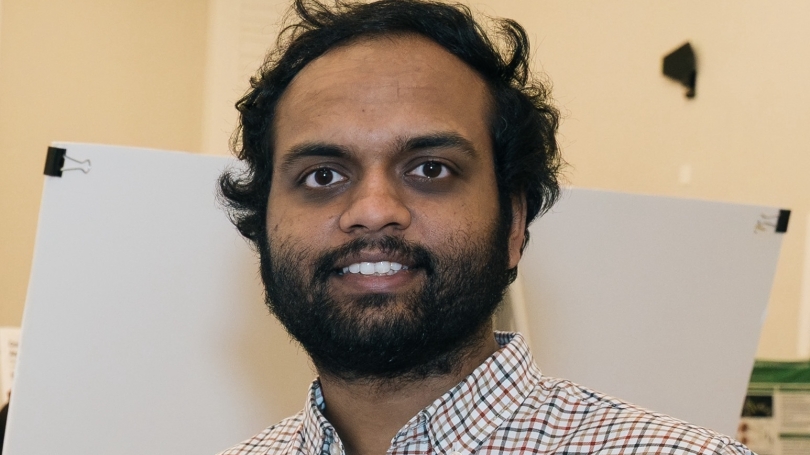Where do you consider your hometown, and how has it influenced your work?
I grew up in Bangalore, India. When I was a kid, the city had less than a million people—now it's closer to 13 million. Experiencing that kind of rapid urban and energy development firsthand shaped how I see the world and approach my work. The power outages, infrastructure growth, and changing energy needs sparked my interest in systems and optimization—how we make decisions under constraints and uncertainty.
Where did you do your undergraduate studies, and in what field?
I studied mechanical engineering at Manipal Institute of Technology. It's a coastal university town in India, which is relatively rare there. It gave me the opportunity to be in a more holistic academic environment, beyond the traditional standalone technical institutions.
What program are you in now at Dartmouth?
I'm in the engineering sciences PhD program at the Thayer School of Engineering, focusing on operations research and mathematical optimization.
What is your area of research? What inspired you to pursue this research?
My work looks at real-world decision-making under uncertainty using optimization. For example, if a coastal town relies on beach nourishment to protect against hurricanes, should they keep doing that every few years—or should they start planning for something more drastic, like paying people to move out?
In my poster, I explored this idea using a model that includes both short-term and long-term strategies under sea level rise uncertainty. Rather than optimizing for just one goal, like minimizing cost, we present decision-makers with a range of trade-offs: spend more now and reduce future damage, or save money and accept higher risks. We built a framework that can adapt depending on a town's priorities and tolerance for risk.
What drew you to this kind of problem-solving?
I've always been interested in optimization. I started my PhD with energy systems, then worked on school bus routing, and now climate resilience. The thread throughout is solving hard, real-world problems with many constraints. This project came about through a collaboration with my co-advisor and a multi-university team—there was a clear need for optimization tools that could handle uncertainty and offer actionable options.
Was there anything surprising or exciting you discovered along the way?
Honestly, it still amazes me how underappreciated the complexity of these problems is. People assume modern tech like AI should make everything seamless, but these optimization problems are incredibly hard—especially when the real world doesn't behave predictably. Even planning a delivery route assumes everyone follows the plan exactly, and that's rarely the case. I find it exciting to work on models that are imperfect but still useful.
Your poster, Considering Retreat Can Lead to More Robust Adaptation Strategies in Nourishment-Dependent Coastal Communities, recently won an award at the Guarini Graduate Student Poster Session. What was that experience like?
Ironically, I entered the competition mostly to take my mind off something else—I wanted a break from other projects I'm working on! Over the past year, I've had a few chances to present my work, including at a conference in Seattle and Dartmouth's Research in Progress series, which really helped me build confidence. I've learned how to craft and deliver a clear message, no matter the format or time limit.
What's your advice to other students preparing to present their work?
Practice every chance you get, whether it's a lab meeting or just a casual chat at a coffee break. Get comfortable talking about your work in 30 seconds or 30 minutes. Tailor your message to your audience—experts, non-experts, even someone you just met. Being able to capture someone's attention quickly is a valuable skill, especially in research communication.
Are there any campus resources or experiences that have been especially helpful during your time at Dartmouth?
Recently, I joined a research communication workshop that's been really useful. Dartmouth also has great support through Research Computing—they've helped me a lot when I get stuck. There are a lot of resources here, especially if you seek them out.
Do you have any advice for someone considering a PhD?
One of the most important decisions you'll make is choosing an advisor whose mentorship style aligns with your goals and values. It makes a huge difference to work with someone who supports your growth—not just academically, but personally as well. I'd also emphasize the importance of maintaining balance. A PhD can be intense, and it's easy to fall into a cycle of constant work, but taking care of your health and well-being is essential for staying motivated and doing your best work over the long term.
